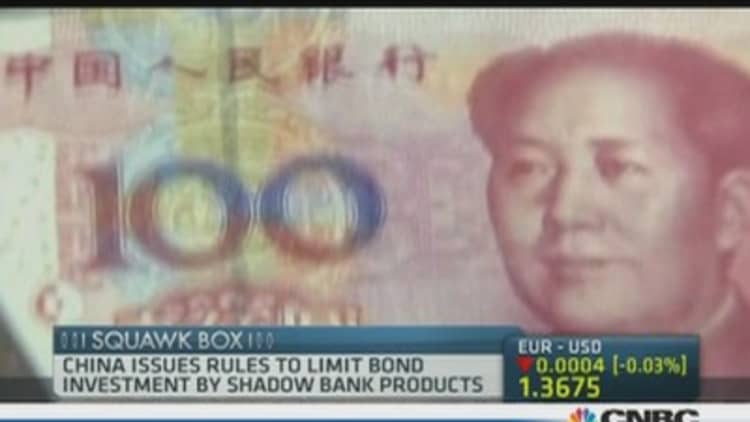
China's trust sector grew at a slower pace in the final months of last year, suggesting that official efforts to curb growth in risky shadow-bank lending may be having some impact.
Assets under management at Chinese trust firms rose to 10.9 trillion yuan ($1.8 trillion) at end-December, the China Trustee Association said on Thursday. That's year-on-year growth of 46 percent, a slowdown from 71 percent and 60 percent growth in the second and third quarters, respectively.
(Read more: Why China isn't readyto let trust investments fail)
But it's still swift growth by most standards, highlighting the challenge facing regulators who want to tame the risk from off-balance loans, which often flow to weak borrowers shut out from traditional bank loans. By comparison, domestic bank loans in China rose by only 14 percent last year.
State media reported on Wednesday that products worth $126 million issued by Jilin Province Trust, and linked to a loan to a deeply indebted coal firm, failed to repay investors when they matured in recent weeks. That followed a near-default on a similar product from China Credit Trust last month.
"The frequent occurrence of individual risk incidents (in 2013) has provoked worries about systemic risk in the trust industry," Zhou Xiaoming, expert director at the trustee association, wrote in a commentary to the data release.
Chinese trust firms are asset managers that sell high-yielding financial products to wealthy households and firms, investing the proceeds in a range of assets, including loans, private equity and listed securities. Trusts overtook insurance companies last year to become the largest holder of financial assets behind commercial banks.
Trust firms comprise the largest segment of China's shadow banking sector and often partner banks to sell so-called wealth management products to wealthy individuals and firms. Jilin Trust's products were marketed through China's second-largest lender, China Construction Bank .
(Read more: China's shadow banking woes are "exaggerated")
Loans officially comprise only 47 percent of total trust assets, but if other loan-like structures are included, the ratio rises to 67 percent, Zhou wrote.

Policymakers have taken a series of steps in recent months to combat the risk from trust loans and other forms of shadow banking.
The central bank has guided interest rates in China's money markets steadily higher since mid-2013, in a move that bankers say was aimed at slowing off-balance sheet lending. Banks and trust companies often rely on short-term borrowing from money markets to fund cash payouts on maturing products, even when the underlying loan or other asset has not yet matured.
Short-term cash rates spiked to historic highs in late June and rose sharply again in December, as the central bank declined to inject extra funds into the system to ease a cash crunch caused in part by a wave of maturing wealth products.
(Read more: China banking worries 'way overblown': Wilbur Ross)
The benchmark 7-day bond repurchase rate has averaged 4.52 percent in the fourth quarter compared to 4.01 percent in the third quarter. It has averaged 4.85 percent so far in 2014.
In addition, regulators have issued a series of rules aimed at clamping down on risky off-balance-sheet lending. Last month, China's cabinet issued new policy guidelines that called on trust firms to return to their traditional role as asset managers rather than lenders.
China's bank regulator has been considering new rules that could limit banks' ability to work with trust companies to shift bank loans off bank balance sheets and into trust products.

